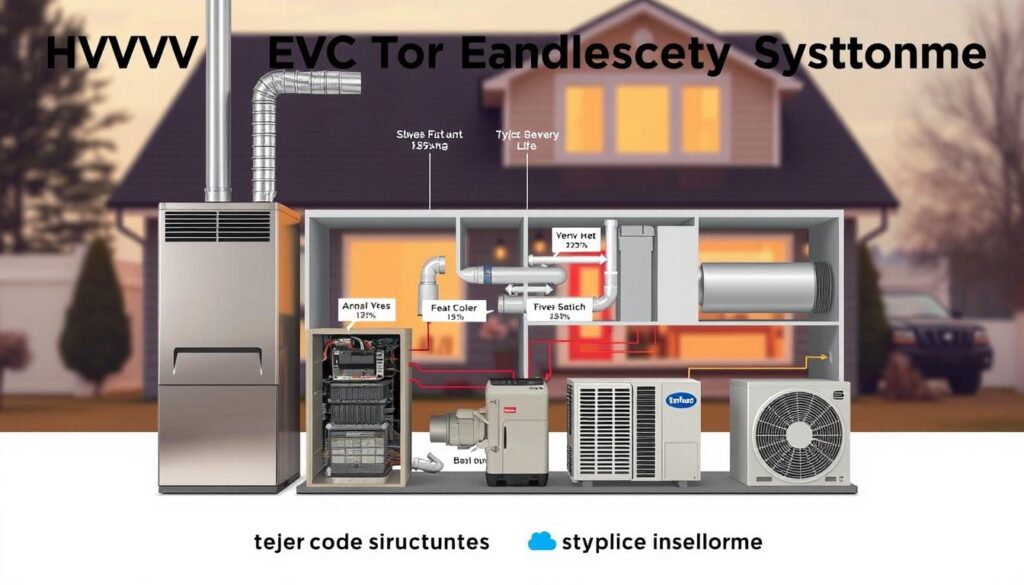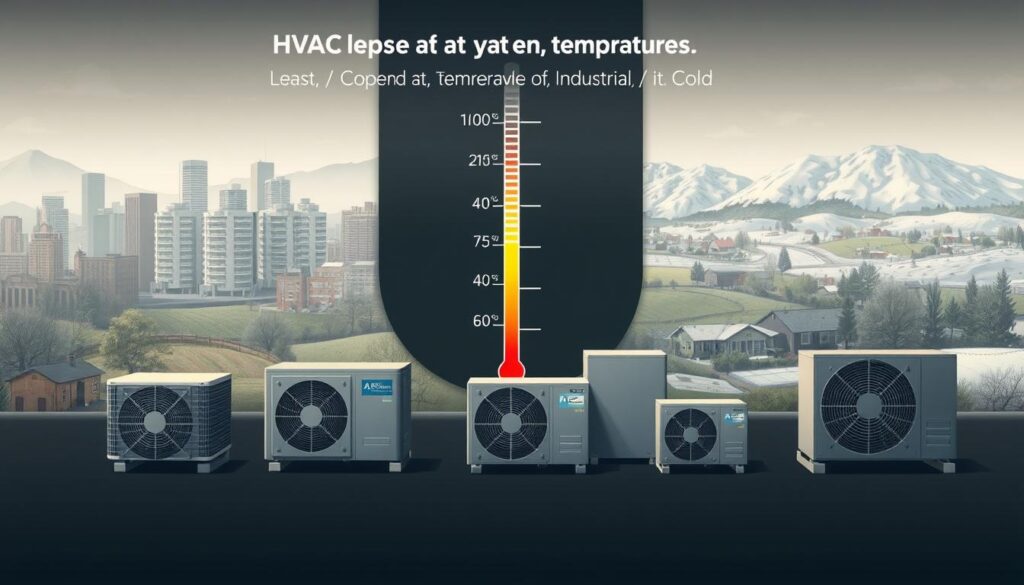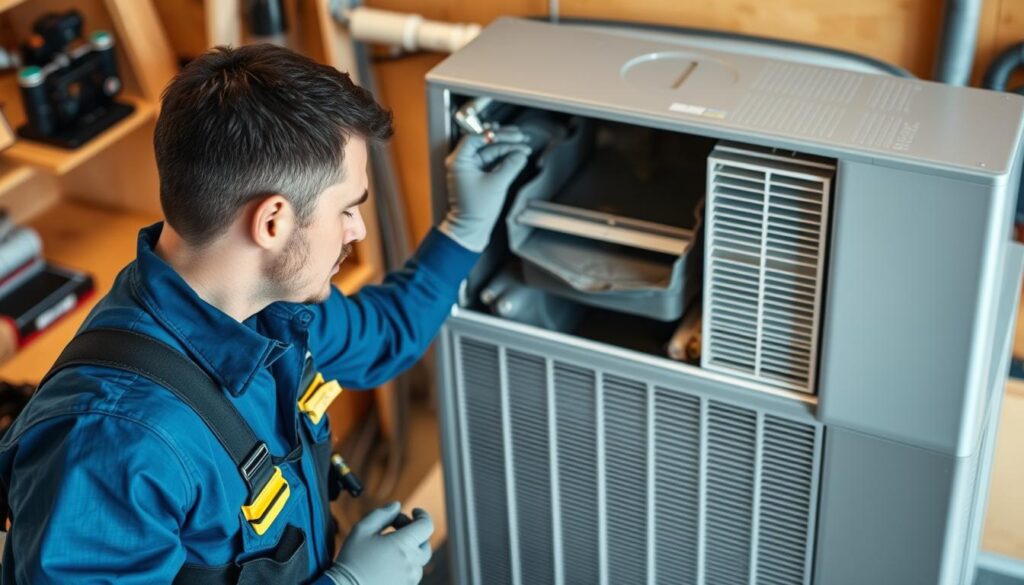Affiliate Disclosure
HVAC Guide Guys is a participant in the Amazon Services LLC Associates Program, an affiliate advertising program designed to provide a means for sites to earn advertising fees by advertising and linking to Amazon.
How Long Does HVAC Last? Ever thought about how long your home’s heating and cooling system will last? Knowing how long your HVAC system will last is key for homeowners. It helps keep your home comfortable and saves you money in the long run.

Most HVAC systems last between 15 to 25 years. But, it’s not just about time. How well your system works, how well you take care of it, and your environment all play big roles.
Buying an HVAC system is a big deal for your home. Different parts, like air conditioning units and heat pumps, last different amounts of time. Each part affects how long and well your system will work.
Key Takeaways
- Average HVAC system lifespan ranges from 15 to 25 years
- Proper maintenance can significantly extend system performance
- Environmental factors critically impact HVAC longevity
- Regular professional inspections help predict possible system failures
- Energy efficiency decreases as HVAC systems age
Table of Contents
Understanding HVAC System Basics
Your home’s comfort comes from a network of heating, ventilation, and air conditioning (HVAC) parts working together. Knowing how your HVAC system works helps you make smart choices about upkeep, efficiency, and when to replace it.
Today’s HVAC systems are advanced machines. They control indoor temperature, humidity, and air quality. The age of your HVAC system affects its performance and how well it works.
Key Components of HVAC Systems
- Furnace: The heart of heating systems
- Air Conditioner: Responsible for cooling
- Heat Pump: Provides both heating and cooling
- Thermostat: Controls temperature settings
- Ductwork: Distributes conditioned air throughout your home
Role in Home Comfort
Your HVAC system does more than just control temperature. It also:
- Regulates air quality
- Controls humidity
- Provides ventilation
- Maintains temperature
Types of HVAC Systems
| System Type | Average Lifespan | Hvac Efficiency Rating |
|---|---|---|
| Central Air Conditioning | 12-17 years | 14-20 SEER |
| Heat Pump | 16 years | 15-22 SEER |
| Furnace | 15-20 years | 80-98% AFUE |
“Knowing your HVAC system is the first step to maintaining home comfort and efficiency.” – HVAC Professional
As your HVAC system gets older, it uses more energy and works less well. Keeping it well-maintained can help it last longer and work better.
Explore Our HVAC Shop
Looking for top-rated HVAC tools, parts, and accessories? Visit our shop and find the perfect solution for your needs.
Visit the ShopAverage Lifespan of Different HVAC Components
Knowing how long different HVAC parts last helps you plan for replacements and upkeep. Each part of your HVAC system has its own lifespan. This affects your home’s comfort and how well it uses energy.
Let’s look at how long different HVAC parts usually last:
- Furnaces: 15-30 years
- Gas furnaces usually last 20-30 years
- Oil furnaces have a shorter life of 10-15 years
- Air Conditioning Units: 12-20 years
- Central AC systems usually last 15-20 years
- Window units last about 10-15 years
- Heat Pumps: 10-20 years
- Air source heat pumps usually last 15 years
- Ductless mini-splits can last 20-30 years with good care
“Regular maintenance can make your HVAC parts last longer than expected.”
Your HVAC system’s lifespan depends on several key factors:
| Factor | Impact on Lifespan |
|---|---|
| Installation Quality | It directly affects how well and long your system works |
| Maintenance Frequency | Regular checks can make parts last 25-40% longer |
| Environmental Conditions | Severe weather can shorten your system’s life |
Pro tip: Change air filters every 60-90 days to keep your HVAC system running well and last longer.
Factors That Impact HVAC System Longevity
Your HVAC system’s lifespan depends on many important factors. Knowing these can help you keep your system running well for longer. This way, you protect your investment in home comfort.
Several key aspects directly influence how long your HVAC system will perform efficiently:
- Environmental conditions
- Maintenance frequency
- Installation quality
Environmental Conditions
The climate greatly affects your HVAC system’s maintenance and durability. Extreme temperatures, high humidity, and coastal salt air can wear it down faster. Dry areas might see more debris, while humid places put a strain on dehumidifiers.
“Your HVAC system’s performance is deeply connected to its surrounding environment.” – HVAC Engineering Experts
Maintenance Frequency
Regular maintenance can make your system last longer. Experts suggest getting maintenance twice a year—once for cooling and once for heating. This keeps your system running smoothly and prevents sudden failures.
| Maintenance Task | Frequency | Impact on Longevity |
|---|---|---|
| Filter Replacement | Monthly | Prevents system strain |
| Professional Inspection | Bi-annually | Extends system life by 5-10 years |
| Component Cleaning | Annually | Reduces wear and efficiency loss |
Installation Quality
Proper installation is key for your HVAC system’s longevity. Incorrect sizing or poor initial setup can reduce your system’s lifespan by up to 50%. A professional installation ensures your system works well, avoiding early wear and inefficiency.
Investing in these areas can greatly extend your HVAC system’s life. This saves you money and keeps your home comfortable for years.
How Long Does HVAC Last in Different Climate Zones

Your HVAC system’s life span greatly depends on your climate zone. Different environments can affect how long your HVAC lasts. Some areas are tougher on systems than others.
Climate zones put unique stress on HVAC systems. Let’s look at how different environments impact your system’s life:
- Coastal Areas: Shortest lifespan of 7-12 years due to salt corrosion and high humidity
- Extreme Cold Regions: 10-15 years, with systems working harder during prolonged winter months
- High Heat & Humidity Zones: Typically 10-12 years, with increased wear from constant operation
- Dust & Sand Climates: 12-18 years, with air filter challenges
- Mild Climates: Most favorable, with systems lasting 15-25 years
Understanding your local environment is key to protecting your HVAC. Coastal homes might need more maintenance. Those in mild climates can enjoy longer system life. Regular checks by pros can help your system last longer.
Factors like installation quality, maintenance, and climate zone affect HVAC life. Getting professional installation and regular care can add 20-30% to your system’s life. This is true no matter where you live.
Explore Our HVAC Shop
Looking for top-rated HVAC tools, parts, and accessories? Visit our shop and find the perfect solution for your needs.
Visit the ShopSigns Your HVAC System Needs Replacement
Knowing when your HVAC system needs a new one can prevent sudden breakdowns and expensive repairs. Spotting the warning signs early helps you decide on replacement before a total failure.
Your home’s comfort and energy use depend on a good HVAC system. As systems get older, they show clear signs it’s time for a new one.
Performance Issues
There are several signs your HVAC system might need to be replaced:
- Inconsistent temperatures in your home
- Weak or reduced airflow from vents
- Strange noises like grinding, squealing, or banging
- Frequent cycling on and off
Rising Energy Costs
An old HVAC system can really raise your energy bills. Unexplained increases in utility expenses often mean your system is losing efficiency. Older units can use up to 50% more energy than newer, more efficient ones.
Frequent Repairs
If you’re always fixing your HVAC, it might be cheaper to get a new one. Spending over 50% of the system’s value on repairs usually leads to replacement.
When repair costs get close to the price of a new system, it’s time to think about replacement.
Getting a new HVAC system can save you money in the long run. It also makes your home more comfortable and uses less energy.
Extending Your HVAC System’s Lifespan Through Maintenance

Keeping your HVAC system running well is key. Regular maintenance can make it last longer and save you money. It’s important for keeping your system efficient and avoiding sudden failures.
Good maintenance needs both professional help and your own efforts. Experts say to get your system checked once a year. This helps find problems early and keeps your HVAC in top shape.
- Change air filters every 3-6 months
- Clean outdoor units quarterly
- Schedule professional tune-ups annually
- Monitor system performance consistently
Simple tasks can make a big difference in your HVAC’s performance. Changing air filters regularly can boost system efficiency by up to 15%. This cuts down on energy use and protects your system’s parts.
| Maintenance Task | Frequency | Potential Efficiency Gain |
|---|---|---|
| Air Filter Replacement | Every 3-6 months | Up to 15% |
| Professional Inspection | Annually | 20-30% |
| Duct Sealing | Every 2-3 years | 20-30% |
Regular maintenance can add 5-15 years to your HVAC’s life. This effort saves you money and keeps your home comfortable and energy-efficient.
Explore Our HVAC Shop
Looking for top-rated HVAC tools, parts, and accessories? Visit our shop and find the perfect solution for your needs.
Visit the ShopCost Considerations: Repair vs. Replace
Choosing between fixing or replacing your HVAC system is a big financial decision. It affects your home’s comfort and energy use. Knowing the costs of replacing your HVAC can guide your choice.
Financial Impact of Aging Systems
Older HVAC systems work less well and use more energy. The average system costs $7,500, but its value drops over time. Repair costs grow as the system gets older.
- Systems usually last 10-20 years
- Repair costs should not exceed 40% of the system’s remaining value
- Energy inefficiency increases with age
Investment in New Technology
New HVAC systems save a lot on energy costs. They can cut heat-based energy use by up to 50%. Systems with higher SEER ratings save money over time.
| System Age | Remaining Value | Recommended Action |
|---|---|---|
| 10 years | $3,112 | Consider replacement |
| 15 years | $1,172 | Strong replacement recommendation |
Return on Investment Analysis
When thinking about replacing your HVAC, consider these points:
- How often you need repairs
- Your current energy efficiency
- Tax credits and incentives
- Long-term energy savings
Pro tip: If repair costs are more than $5,000 and your system is old, replacing it might be cheaper.
Conclusion
Knowing how old your HVAC system is and if it needs an upgrade is key. It helps keep your home comfortable and saves energy. Most systems last 15 to 20 years, and regular care can make them last longer.
New HVAC tech is much better than old systems. If your system is about 15 years old, it’s time to think about upgrading. Upgrades like energy-efficient heat pumps and smart thermostats can save you money and make your home more comfortable.
Keeping your HVAC in good shape is important. Regular checks, clean filters, and knowing how your system works help you decide when to fix or replace it. This keeps your home cozy and saves you money.
By paying attention to your HVAC, you can make it last longer and avoid costly repairs. A smart plan for your heating and cooling can bring many benefits. It improves comfort, saves energy, and cuts down on costs in the long run.

